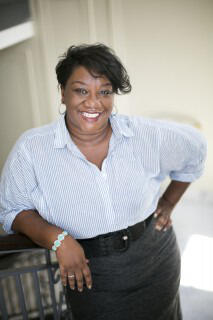July 14, 2016
Sociology professor on racism, inequality: ‘We get better’
Tressie McMillan Cottom discusses Black Lives Matter, racial bias and the future of race relations in the U.S.
Share this story

The recent shootings of African-American men by police in Louisiana and in Minnesota, followed by the shootings of five police officers in Dallas, have once again sparked protests across the country and debate over racial bias and disparities in the criminal justice system.
Tressie McMillan Cottom, Ph.D., an assistant professor in the Department of Sociology in the College of Humanities and Sciences at Virginia Commonwealth University and a faculty associate at the Berkman Center for Internet and Society at Harvard University, has been a prominent voice nationally in the debate.
She recently spoke with VCU News about Black Lives Matter, the roles of implicit and explicit bias, and why she has hope for better things ahead.
In the wake of the police shootings of Alton Sterling and Philando Castile, the shootings of five police officers in Dallas, and protests across the country, do you feel that we’re at a pivotal moment for race relations in the U.S.? Do you foresee positive changes ahead? What are the keys to making real progress?
I am not sure if this is a pivotal moment for race relations. It is shaping up to be a pivotal moment for social movements in the U.S. and abroad. The banner of Black Lives Matter has become a global phenomena. Sociologists aren’t good at predicting the future — there are just too many variables in the social world.
I don't know that I foresee positive changes but I am very encouraged by young people finding their political voice, groups forming coalitions across race, class, gender and identity, and the impact this has had on the election season. I am hopeful because those are the keys to making real progress — political organizing, multigenerational social movements, coalition building and political change.
You and many others have discussed how implicit bias plays a crucial role in police interactions with African-Americans. How can that bias be successfully addressed?
First, let me be clear that implicit bias is part of a larger apparatus of explicit bias, state-sanctioned bias, and accumulated systemic disadvantage. Each of these must be addressed for any one of them to be addressed.
The first step is acknowledging that good intent does not necessarily make for good actions or good politics. It is hard to accept our inherent biases and unearned privileges. But, if we are committed to justice, each of us must do this personal work of accepting that we do not always live up to our ideal selves. I know many of my colleagues accept the challenge of education as critical to this process. For example, many of us use the implicit bias association test from Harvard University to explore these issues in the classroom. That’s part of addressing bias: acknowledging it, labeling it and becoming conversant in its history and context.
More broadly, as citizens we can demand that our public services also do this hard work so that we are better stewards of the public’s faith in our police, emergency services, political bodies and civic institutions.
As a sociologist who studies issues of race and class, what have been your big takeaways from the last couple weeks? Has the discussion been missing anything important that you’d want to highlight?
I tell them the other big lesson from sociology: We get better.
My takeaway is that sociology is still very much necessary. There is a reason that we see more sociologists in the news and in the public sphere. We are trained to think about how history and the circumstances of our biography shape and are shaped by each other. We are trained to understand complex social processes like the macro conditions that produce racially segregated neighborhoods where micro processes like interpersonal discrimination and implicit bias result in violence and broken public trust.
Often, when I teach my undergraduate sociology of race and ethnicity course, the students say they’re so discouraged by the historical trajectory of race and racism, class and inequality. I tell them the other big lesson from sociology: We get better. We really do. We long have. Our social organisms get healthier. Our humanness becomes more expansive. We make a difference and we change things for the better.
And that’s my takeaway over a few weeks that have been part of a brutal few years in a history of dark moments: We get better. It is hard to see it in the short term but it is true in the long term if we work towards it.
So, I am cheered when young people want to organize, when older people share their wisdom with a new generation of scholars and activists, and when we keep showing up to practice democracy in difficult, dangerous conditions. If anything is missing from the national conversation it is that practicing democracy is messy — and that is what we’re seeing, democracy in action — and that, if history proves right, those who are practicing that democracy right now do so for the benefit of us all.
Subscribe for free to the weekly VCU News email newsletter at http://newsletter.news.vcu.edu/ and receive a selection of stories, videos, photos, news clips and event listings in your inbox every Thursday.
Subscribe to VCU News
Subscribe to VCU News at newsletter.vcu.edu and receive a selection of stories, videos, photos, news clips and event listings in your inbox.













